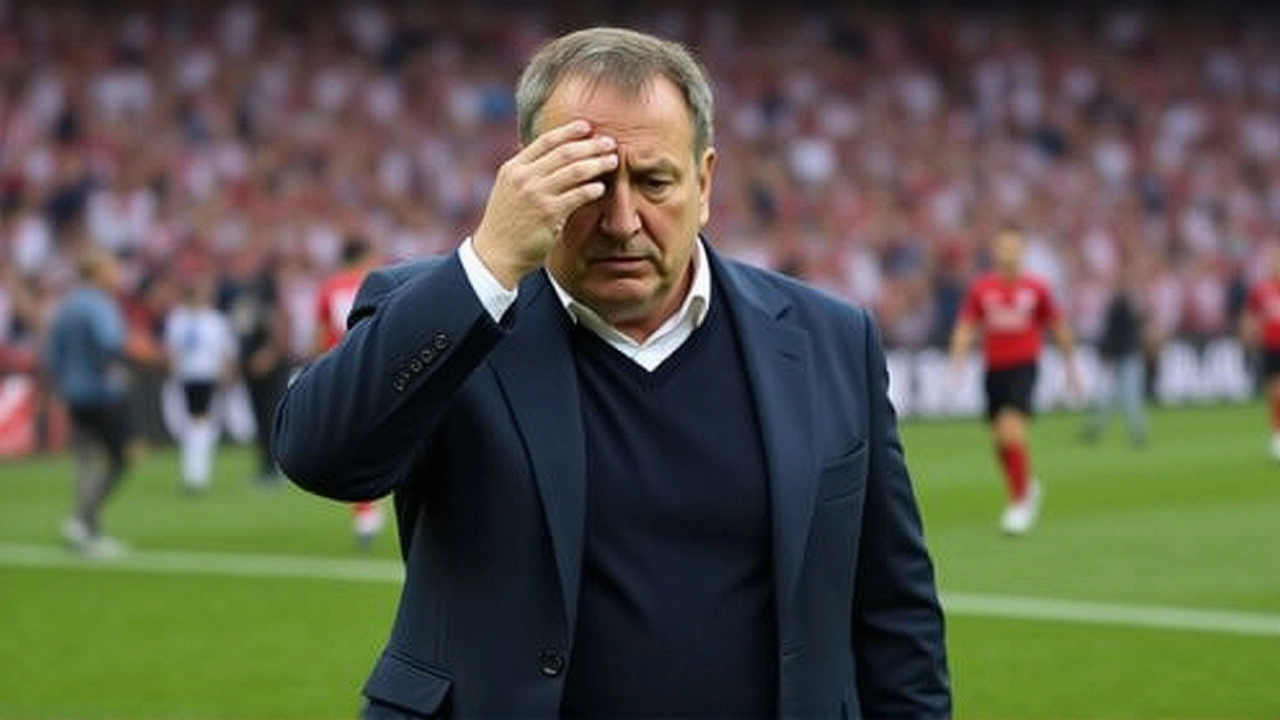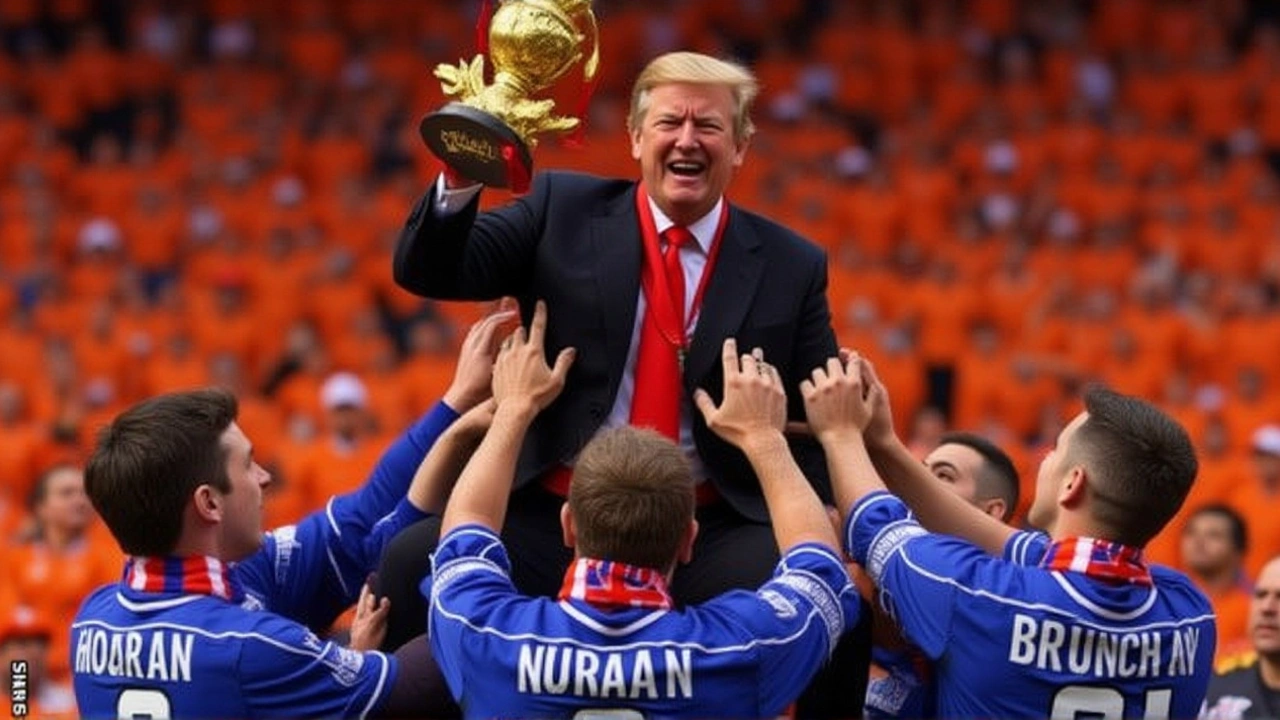When Dick Advocaat boarded a flight out of Kingston on November 17, 2025, he left behind more than a team—he left behind a dream. At 78, the Dutch legend was one win away from making history: becoming the oldest coach ever to lead a team at the 2026 FIFA World CupNorth America. But family called, and Advocaat answered. His sudden departure, framed by the Curaçao Football Federation as an urgent personal matter, didn’t dim the squad’s resolve—it ignited it.
"We Want to Finish It Together"
Leandro Bacuna, captain and former Aston Villa star, didn’t wait for a team meeting to rally the troops. In an interview with Algemeen Dagblad on November 18, he didn’t mention Advocaat’s absence as a setback—he called it a mission. "We started this all together and now we want to finish it together," he said. "The coach doesn’t have to worry. We will give everything against Jamaica."
It’s not just rhetoric. This squad has been through worse. Bacuna remembers flying home from a match with no flight booked, sleeping on airport benches, wondering if football would ever treat them right. Now, they’re one point ahead in Group B—11 points from five unbeaten games, including a 7-0 thrashing of Bermuda on November 14. Jamaica, their next opponent, sits just behind after a 1-1 draw in Trinidad. The stakes? A spot in the 2026 World Cup. For a Caribbean nation with no prior World Cup appearance, it’s more than football—it’s identity.
The Man Who Coached Half of Europe
Dick Advocaat isn’t just any coach. He’s the man who guided PSV Eindhoven to a European Cup final, turned Rangers FC into Scottish giants, and led Zenit St Petersburg to a UEFA Cup title. He’s managed seven national teams—from South Korea to Russia. And now, at 78, he’s chasing a record no one thought possible: surpassing Otto Rehhagel, who coached Greece at 71 in 2010. The world took notice. Steven Gerrard, current manager of Rangers FC, told Dutch outlet Voetbalprimeur: "I look with admiration at the career of Dick Advocaat." Even in retirement, Advocaat casts a long shadow.
His presence in Kingston was brief—just two days. But his fingerprints are everywhere. The squad’s discipline. The tactical clarity. The quiet confidence. And the 22 Dutch-born players? That’s no accident. Advocaat didn’t just recruit talent—he built a bridge between the Netherlands’ footballing DNA and Curaçao’s raw passion. Players like Eloy Room, the goalkeeper who once played for the Dutch U21s, and Tyty Chong, a former Manchester United youth product now at Sheffield United, didn’t just join the team—they chose it. "It’s not a club anymore," Room told NOS. "It’s our country. We’re playing for something bigger."
The Weight of History
History is watching. Three teams—Jordan, Uzbekistan, and Cabo Verde—have already qualified for the first time in their histories. Norway, with Erling Haaland, returns after 27 years. But Curaçao? They’ve never even made it past the qualifiers. A win over Jamaica on November 19 wouldn’t just qualify them—it would rewrite Caribbean football. And if they do, Advocaat, watching from the Netherlands, would become the oldest coach in World Cup history. The record isn’t just a stat—it’s a symbol. It means age doesn’t end relevance. It means legacy isn’t measured in trophies alone, but in the belief you inspire.
Advocaat’s message to the team was simple: "I have complete confidence in this group." But the players didn’t need his words. They needed his absence. It gave them ownership. It gave them purpose. "We are going to do it here for the country and for our coach," Bacuna said. That’s the twist. Sometimes, the greatest motivation isn’t a pep talk. It’s silence.

What’s Next?
The match against Jamaica on November 19 is the final hurdle. A win, or even a draw, seals qualification. A loss? It forces a playoff against another CONCACAF team. Either way, Advocaat won’t be on the sideline. He’ll be on a screen, in a living room in the Netherlands, phone in hand, watching every pass, every tackle. If Curaçao qualifies, the world will ask: Did he do it alone? The answer is no. But he made it possible.
And if they don’t? That’s not the end. Advocaat has said this might be his last assignment. But football remembers those who dare. He’s already changed the game in places no one expected. Now, he’s changed a nation’s belief.
Frequently Asked Questions
How does Advocaat’s absence affect Curaçao’s chances against Jamaica?
While Advocaat’s tactical presence is missed, Curaçao’s players have shown remarkable cohesion under interim leadership. Captain Leandro Bacuna and goalkeeper Eloy Room have taken charge, and the team’s 11-point unbeaten run proves their structure is deeply embedded. The squad’s familiarity with Advocaat’s system means they’re playing with instinct, not uncertainty. In fact, the emotional boost from proving themselves in his absence may outweigh the loss of his sideline presence.
Why are so many Dutch-born players on Curaçao’s team?
Curaçao, a former Dutch colony, has long drawn talent from the Netherlands’ Caribbean diaspora. Many Dutch-born players with Curaçaoan heritage choose to represent the island because it offers them a rare chance to play international football at a high level. Advocaat, with his deep ties to Dutch football, helped formalize this pipeline—recruiting players like Eloy Room and Tyty Chong who were either overlooked or underutilized in the Netherlands’ competitive system.
What would qualifying mean for Curaçao beyond football?
A World Cup spot would be transformative. With a population of just 160,000, Curaçao has never had global visibility. Qualifying would trigger national holidays, boost tourism, and attract investment in youth infrastructure. It would also validate decades of grassroots efforts by local clubs and schools. For many, it’s not just about football—it’s about dignity. As Bacuna said, "Now everything is arranged properly." That’s the real victory.
Is this really Advocaat’s last coaching job?
Dutch media like Headliner suggest this is likely his final assignment. At 78, he’s already broken age barriers in football. But Advocaat has never been one to announce retirement. He’s a man of quiet determination. If Curaçao qualifies, he may step away. If they don’t, he might consider one more challenge—perhaps mentoring a successor. Either way, his legacy is already cemented: he turned a team with no history into one with a future.
Who could Curaçao face if they qualify for the World Cup?
If Curaçao qualifies, they’d be placed in a group with other teams from the CONCACAF region. South Korea, already qualified, is a possible opponent—managed by former captain Hong Myung-bo. Other likely rivals include the United States, Canada, or Mexico, depending on final draw outcomes. A match against South Korea would be poetic: Advocaat coached the Korean national team in 2002, and now his legacy could intersect with one of his former players’ teams on the world’s biggest stage.
How does this compare to other underdog World Cup stories?
Curaçao’s journey mirrors Iceland’s 2016 Euro run and Costa Rica’s 2014 World Cup surprise—but with deeper roots. Unlike those teams, Curaçao lacks a professional domestic league and has fewer resources. Yet, under Advocaat, they’ve built a professional setup: proper training camps, medical support, and flight logistics. Their story isn’t just about heart—it’s about smart leadership. And that’s what makes their potential qualification more remarkable than any fairy tale.
